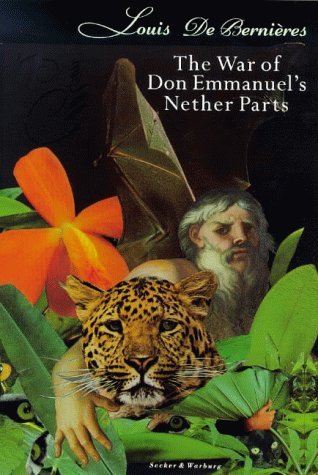What do you think?
Rate this book


Hardcover
First published January 1, 1990
Hectoro was an intelligent and intolerant man who looked on life very simply. A man needs women – he had three; he needs shelter – he had three; he needs money – he was foreman on the gringo’s hacienda; he needs status – he had his own mule, a revolver in a holster, leather bombachos, he could rope a steer with infallible precision, and he could hold alcohol in his wiry frame like no man else. The doctor had told him he was to die of liver failure because of the drink, and truly his skin had become yellowed; but he was proud and fiery-tongued, and he had threatened to shoot the doctor, who had then changed his diagnosis to something less disagreeable.
...
Don Emmanuel had become a local legend both on account of his delight in healthy dissolution, his choice of peasants as his natural friends, and his prodigious social concern. He had built the village school and employed Profesor Luis to teach not only knowledge but wisdom to the raggedy children; he paid a quarter more than any other patron in the whole department, and he adopted a method of making breezeblocks in a wooden lattice so that he could build a little house for each of his employees. It was in his Land-Rover that the whores went every Thursday for their check-up, he arbitrated in domestic disputes, he never failed to labour alongside his men, and many local women were able to testify that even the purest bred Negros were not more lusty nor more satisfying than he was. The only thing that they thought unacceptable about him was that he would always refuse to smoke, a quirk that was considered anti-social in a land where everyone of peasant stock, man, woman and child always had a large cigar stuck in their mouth, where only effeminate oligarchs smoked cigarettes, and where pipes were smoked only by French engineers and English alpinists. These cigars are, like their coffee, easily the most sublime in the world, but of both commodities they keep the best to themselves, exporting only the dross for the world’s connoisseurs to praise. To smoke one of those cigars outdoors of an evening in a hammock whilst drinking half a litre of thick black coffee is to condemn oneself unknowingly to a lifetime of nostalgia.
...
And it was the mountains that General Fuerte loved the most, for as one proceeds through the altitudes, the climate and the life change through three distinct stages. For the first seven thousand feet it is the Garden of Eden, a luxuriance of orchids, humming-birds, and tiny streams of delicious water that run by miracle alongside every path. Above this height for three or four thousand feet is a world of rock and water draped like hanging gardens with alien, lunar plants in shades of brown and red and yellow with a habit so curious and enchanted as to be found in books of legend and romance. Above this is the Venusian world of ice, of sudden reckless mists of palpable water, of lichen and trickling springs, of fragmenting shale and glistening white peaks, where human realities become remote and ridiculous, where the sky is actually below you and inside you, where breathing is an accomplishment in itself, and where condors, inconceivably ponderous and gigantic, wheel on the upcurrents like lords of a different and fantastic universe.
'It has come to my ears, dear lady, that you intend to divert with a canal the very river which waters my land and that of the campesinos in order to replenish your piscina. I must say, as I know you appreciate frankness, that I and the local people will be fucked, buggered and immersed in guano of the finest Ecuadorean provenance before we permit such a thing to occur.’
'The permission,' she rallied, her temper rising almost immediately beyond control, 'is not yours or theirs to grant. I will do as I wish with the water on my land.'
'I appeal,' said Don Emmanuel, 'to your highly-developed social conscience and to your concern for my nether parts.'
The bulldozer took one month to arrive from Asuncion, two hundred kilometres away. It was not just that the machine was slow, which it was, nor that the roads were appalling, which they were; it was simply that the driver was easily bribed into doing all sorts of lucrative little oddjobs along the way, especially as he revelled in the people’s admiration for the awesomeness of the feats that his beloved machine could perform with magical ease. He gave free demonstrations to interested knots of people who never tired of seeing trees pulled over to no purpose, and huge fearsome bulls dragged along by a rope around the horns despite their having their hooves firmly planted against the soil and all their muscles straining. Halfway to the pueblo he had to turn back to Asuncion to fetch more diesel.